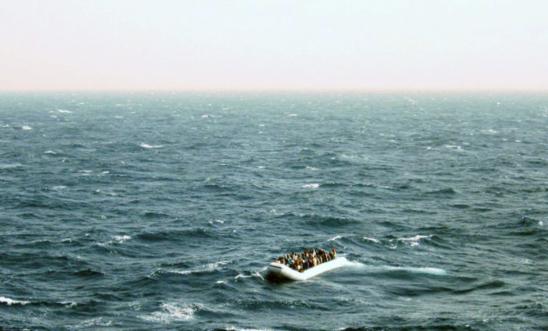
Press releases
Italy: MPs should reject 'unworkable, harmful and unlawful' migration deal with Albania - new briefing

‘Externalisation’ deal will see people taken hundreds of miles by sea to Albania and face arbitrary detention
Children, pregnant women, survivors of trafficking and torture at additional risk
‘This agreement represents yet another shameful attempt by Italy to circumvent international and EU law’ - Matteo de Bellis
Lawmakers in Italy must reject a planned agreement between the governments of Italy and Albania which would see people who have been rescued at sea by Italian ships taken hundreds of miles away to Albania and automatically detained, said Amnesty International, as the Italian parliament begins a debate over ratification of the deal.
The scheme to build migrant detention centres in Albania is part of a broader international trend to move border control and asylum processing to third countries - a process known as “externalisation” - and is a move that threatens the human rights of migrants and refugees.
In a new 11-page briefing, Amnesty sets out its concerns about the human rights impacts of the Italy-Albania agreement.
With hundreds of miles between the central Mediterranean - where most crossings and shipwrecks occur - and Albania, the agreement patently breaches Italy’s obligation to disembark people rescued at sea as promptly as possible following their rescue. It may also weaken the wider search and rescue system, which is likely to jeopardise those in need of rescue at sea.
Under the terms of the deal, Italy would have legal responsibility for the centres in Albania, unlike in “externalisation” projects envisaged by other European countries, such as the UK’s controversial Rwanda bill. While the application of Italian jurisdiction in the centres appears to promise access to procedural guarantees and asylum rights in accordance with Italian and EU law, in reality access to such guarantees could be severely hampered.
All those brought to the centres in Albania, including people seeking asylum, would be automatically detained despite automatic detention being inherently arbitrary and therefore illegal. Combined with recent changes to Italian law, the agreement could lead to people being detained for more than 18 months. Accessing legal aid and legal representation to challenge the legality of detention from Albania would inevitably be very difficult, further adding to the risk of arbitrary detention.
The agreement also risks undermining the system for the identification and protection of children, pregnant women, survivors of trafficking and torture, and other groups of individuals in need of specific care. The agreement fails to make clear how assessments to determine an individual’s vulnerability will be conducted or how minors and other vulnerable groups who cannot be detained will be protected.
Matteo de Bellis, Amnesty International’s Migration and Asylum Researcher, said:
“By externalising asylum processing and detention outside national borders, this agreement represents yet another shameful attempt by Italy to circumvent international and EU law, with possible severe consequences for people seeking asylum.
“This unworkable, harmful and unlawful proposal would see people in distress subjected to long and unnecessary transfers by sea and ending up in automatic and potentially prolonged detention, in violation of international law.
“Children, pregnant women and survivors of trafficking and torture will have to endure long and unnecessary transfers by sea and, due to shortcomings in screening procedures, they may be exposed to further harm.
“People disembarked in Albania will be arbitrarily detained and will also face serious challenges in accessing asylum and effective remedies for human rights violations.
“Rather than ratifying this harmful agreement, Italian MPs should instead support measures to ensure adequate reception in Italy, access to an effective asylum procedure, and safe, regular access routes, particularly for people seeking international protection.”